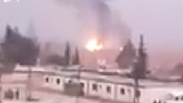
Syria strike was not driven by elections
Analysis: As far as Israel is concerned, destroying Hezbollah-bound missiles is a necessary military action aimed at removing or reducing a threat which will cause dramatic damage in the future.
Syrian authorities confirmed within a short while that these were Israel Air Force jets. Jerusalem, as usual, did not comment.
According to reports in the Syrian and Lebanese media, IAF planes attacked two Syrian air force hangars and another military facility near Syria's international airport. Syrian opposition websites reported Sunday that the bombings targeted a missile shipment from Iran to Hezbollah in Lebanon.
Lebanese military sources said that six Israeli Air Force jets had invaded Lebanon's airspace Sunday morning on their way to attack the Syrian targets. They said the IAF planes had also flown over the towns of Daraa and Quneitra.
According to foreign reports, this is the eighth time in recent years that the IAF strikes on Syrian soil.
In most cases, the strikes targeted shipments of advanced missiles which had just landed in Damascus, like Fateh-110 and M-600 with very accurate warheads of hundreds of kilograms, whose abilities Israel's citizens will be well aware of in the third Lebanon war. Later on, they targeted surface-to-air missiles and a shipment of Yakhont anti-ship cruise missiles.
An attack like the one carried out Sunday requires many weeks of intelligence and operational preparation.

Contrary to what we might think, this isn't an election strike. Those trying to link the alleged Israeli strike in Syria to a political scheme aimed at attracting more votes are likely unfamiliar with the IDF in the current era, and especially with the cautious – sometimes too cautious – chief of staff, Benny Gantz.
In the sub-national reality, in light of the fact that Syria and its army have lost control, Israel must sustain its flight, attack and intelligence collection abilities, like it is doing in Lebanon. Israel must protect its interests, especially in the face of the threat of a spillover of advanced weapons, which will make the next war pretty complicated.
If the reports are true, as far as Israel is concerned this is a necessary military action aimed at removing or reducing a threat which will cause dramatic damage in the future. The Syrians, who understand that very well, replaced the IDF spokesperson and issued an official announcement about the strike.
The fact that there were no casualties proves that Israel is not interested in an escalation on the northern front, but is seeking to gradually uproot the problems and threat while they are still small.
Only one strike led to a response and changed the rules of the game. It was the alleged Israeli strike in February, which was carried out for the first time on Lebanese soil. Hezbollah Secretary-General Hassan Nasrallah clarified immediately after the attack that his organization would not accept a violation of its sovereignty. He vowed to retaliate and acted on his threat with a series of incidents on Israel's borders with Syria and Lebanon, which miraculously ended with no dead soldiers and no escalation.
Sunday's strike is similar in its magnitude to the two significant strikes which were carried out on Syrian soil in early May. Syria did not respond then and will likely not respond now either. According to estimates, Hezbollah is Lebanon's defender, not Syria's, and will therefore contain the incident and not retaliate.
Hezbollah is expected to play by the rules it has set, but the situation may be inflamed by the Iranians, who are looking for any opportunity and may do so through rebel organizations.
It should be noted, however, that despite the successful strikes and the thwarted weapon shipments, this is just a drop in the ocean. Hezbollah has managed to empty out and gain control over almost all of the Syrian army's weapons.
The IDF's working premise is that in the third Lebanon war it will face a terror organization with abilities of a state, which will make the next war particularly complicated.










